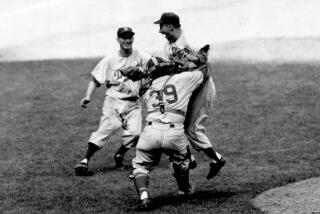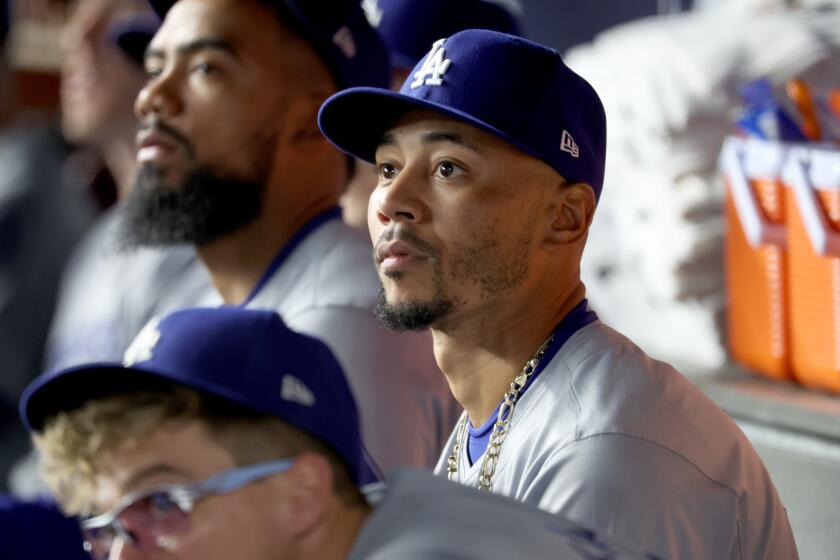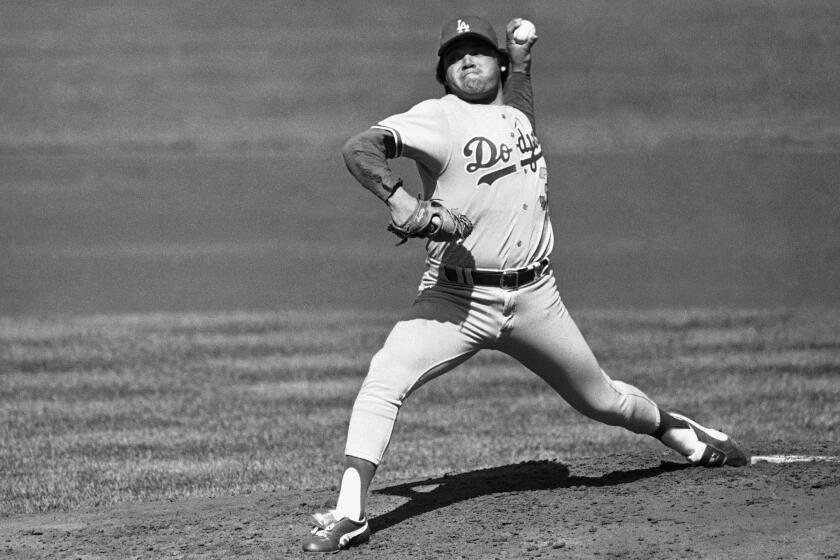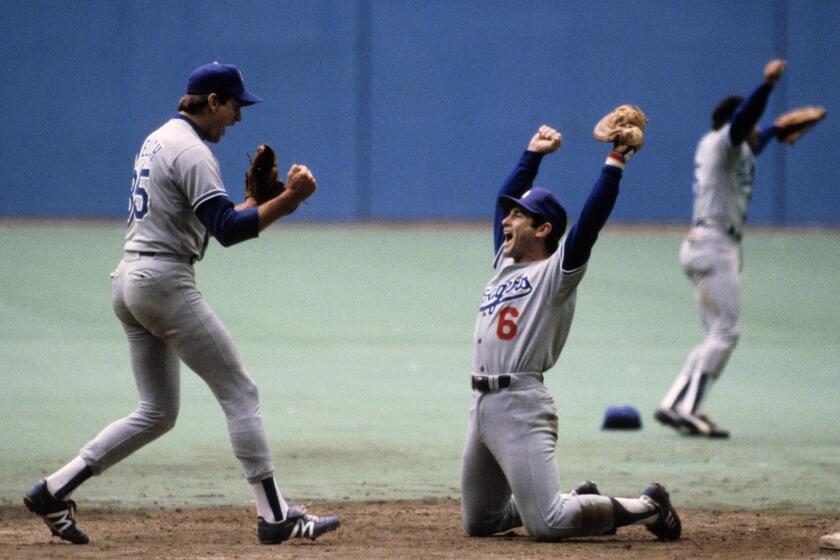
NEW YORK — It had felt so close, yet remained so difficult to cement.
For more than a decade, the Dodgers had aimed for more than just regular-season success. More than just repeated trips to the postseason. More than just a lone, COVID-bubble championship in a pandemic-shortened 2020 season.
This, as president of baseball operations Andrew Friedman had declared time and again, was supposed to be a “golden era of Dodgers baseball,” a generation of organizational excellence unmatched in the storied, but often tortured, history of the century-old franchise.
The fact it hadn’t become that yet was a source of annual internal consternation. So much so, even Friedman’s deep-pocketed bosses became fed up.
As the Dodgers wooed then-free agent Shohei Ohtani over the winter — pitching the two-way star and two-time MVP as the missing piece to the team’s still incomplete legacy — it was the club’s Mark Walter-led ownership group that delivered the most resounding message.

“They said when they look back at the last 10 years, even though they’ve made the playoffs every single year, and won a World Series ring, they consider that a failure,” Ohtani later said at his introductory Dodgers news conference, recounting the message Walter delivered during the team’s meeting with the two-way star.
“When I heard that,” Ohtani added. “I knew that they were all about winning.”
Indeed, from the fires of past October failures, the Dodgers forged a renewed resolve this year.
And in Game 5 of the World Series on Wednesday night, it led them to a championship in the most stunning of ways.
Despite falling behind the New York Yankees by five runs in the first three innings Wednesday night, the Dodgers mounted a title-winning comeback. They scored five times in a fifth-inning rally fueled by shockingly poor Yankees defense and clutch hits from Freddie Freeman and Teoscar Hernández.

The final out of the Dodgers’ Game 5 win over the New York Yankees to clinch the 2024 World Series title.
After falling behind again in the sixth inning, the Dodgers found yet another answer, manufacturing two eighth-inning runs off of two sacrifice flies to take a lead before a stunned Yankee Stadium crowd.
The final six outs were stressful, with Blake Treinen taking care of the eighth, and — in another unthinkable turn — starting pitcher Walker Buehler emerging for the save in the ninth.
But when the last out was recorded, a club so hungry to add to its 2020 title came pouring out of the dugout, mobbing Buehler on the mound before hoisting the commissioner’s trophy high into the New York night.
“I don’t think you would want to be any other organization than us,” Buehler said. “There’s nowhere else I’d rather be. And I think this kind of tops that off.”
They’d finally crossed the threshold of baseball immortality. They validated the golden era they had so long been chasing.
Welcome to the Dodgers’ golden era, with the franchise’s big spending paying off in its greatest World Series championship run, Bill Plaschke writes.
With a 7-6 defeat of the Yankees, securing a four-games-to-one series win, they were once again champions of baseball.
Fighting, scratching and clawing all the way to the end.
“I’m just so grateful to be in this chair, and of what our guys did; the resilience, the fight that they had,” said manager Dave Roberts, who became the third skipper in franchise history with multiple World Series titles — joining Tommy Lasorda and Walter Alston.
“This is something I really wanted,” Roberts said. “I wanted this one.”
Freeman was the World Series MVP, after following up his four home runs in the first four games — including his iconic walk-off grand slam in Game 1 — with a two-run single in Wednesday’s fifth inning, tying a World Series record with 12 RBIs.

“To overcome what we did,” he said, “it’s just a special group of guys.”
The Dodgers’ best performer of the entire postseason, meanwhile, was outfielder Mookie Betts, who was one of 12 players to have a hand in the 2024 and 2020 triumphs, and drove in the go-ahead run Wednesday with the second of the eighth-inning sac flies.
“Probably my favorite group of guys I’ve been around,” said Betts, now MLB’s only active position player with three World Series rings. “And I’ve been a part of some really great teams, with a bunch of really good characters. But this team right here, man, I love each and every one of them.”
This Dodgers team always seemed destined to reach the mountaintop. They made sure of that in the winter, when a roster already headlined by former MVP winners Betts and Freeman was bolstered by the additions of Ohtani, star Japanese pitcher Yoshinobu Yamamoto, expected ace Tyler Glasnow and veteran outfielder Hernández; plus the re-signing of the most central figure of the franchise’s recent past, future Hall of Fame pitcher Clayton Kershaw.
In the regular season, they led the majors with 98 wins, won the National League West for the 11th time in the last 12 years and watched Ohtani author the first 50-home run, 50-steal season in MLB history, all but assuring himself of his third MVP award.
“To be able to get to know this team … and experience winning a World Series has been a tremendous honor,” Ohtani said through interpreter Will Ireton.
After 36 long years, the Dodgers will be able to celebrate a World Series title with their fans during a victory parade scheduled to take place Friday.
Getting there, however, required the Dodgers to traverse a road with more potholes and detours than they could have ever imagined.
There was scandal early in the season, when Ohtani’s former interpreter, Ippei Mizuhara, was fired by the team and later arrested for stealing nearly $17 million from the slugger to cover gambling losses.
There were injuries throughout the campaign, from Betts’ broken hand in June, to Freeman’s broken finger in August, to a litany of pitching losses that sidelined Yamamoto for three months and Glasnow, Kershaw and standout rookie Gavin Stone for the postseason.
There was October adversity, as well. Freeman was limited by a badly sprained right ankle. Betts and Ohtani both endured early playoff struggles. And in the NL Division Series, the club faced elimination against the rival San Diego Padres after just three games.
“It seems like we hit every speed bump possible over the course of this year,” Freeman said.

“Even in the postseason,” Roberts added, “I don’t think anyone had us picked.”
But unlike past Dodgers teams that flamed out in the playoffs, this year’s group never deterred, bonding together through clubhouse meetings and player-only bus rides and cross-country flights in which even their families weren’t allowed.
“We got together and said, ‘Hey guys, just us. No family, no kids, nothing,’” third baseman Max Muncy said. “We’re doing this together, we’re grinding together. Until that last out of the World Series.”
After rallying against the Padres, then dispatching the New York Mets in six games to win the pennant, that moment finally arrived Wednesday night, in what became the biggest come-from-behind win ever mounted by a club trying to close out a World Series.
Four batters into the bottom of the first, the Yankees had a 3-0 lead on home runs from Aaron Judge and Jazz Chisholm off starter Jack Flaherty. By the end of the third, Flaherty was out of the game and New York had stretched the score to 5-0. With the Dodgers still searching for a hit off Yankees ace Gerrit Cole, it seemed certain the series would head back to Los Angeles.
Then, suddenly, the Yankees’ defense capitulated.
And once they cracked the door open, the Dodgers came bursting through it.
After a leadoff single from Kiké Hernández, Judge flat-out dropped a line drive off the bat of Tommy Edman. He couldn’t throw to second in time to get Hernández, either, after he made a quick turn and aggressive slide into the bag.
The Dodgers and New York Yankees will play Major League Baseball’s starriest World Series in decades.
Shortstop Anthony Volpe erred next, spiking a throw to third on a ground ball from Will Smith to load the bases with no outs.
Cole then made the most puzzling of miscues. After striking out Gavin Lux and Ohtani in consecutive at-bats, he got Betts to hit a ground ball to first baseman Anthony Rizzo — only to fail to cover the bag for what would have been an inning-ending out.
Hernández scored. Everyone else was safe. And the Dodgers’ comeback was just beginning.
“I just know I hit it, and I had to run,” Betts said. “And I’m glad Cole didn’t cover first.”
Two batters later, the score was tied at 5-5. Freeman knuckled a two-run single to center. Teoscar Hernández blasted a two-run double over Judge’s head in the gap.
And though the Yankees briefly led again on a Giancarlo Stanton sacrifice fly in the sixth, the turnaround came complete in the eighth, when the Dodgers loaded the bases against Yankees reliever Tommy Kahnle, then got sac flies from Lux and Betts off closer Luke Weaver.
1

2

3

4

5

1. Freddie Freeman runs past third base to score in the fifth inning. (Robert Gauthier / Los Angeles Times) 2. New York Yankees star Aaron Judge celebrates after hitting a two-run home run in the first inning. (Wally Skalij / Los Angeles Times) 3. Dodgers reliever Blake Treinen pounds his chest after the final out of the seventh inning in Game 5 of the World Series against the Yankees. (Robert Gauthier / Los Angeles Times) 4. Dodgers pitcher Jack Flaherty sits in the dugout after being pulled in Game 5. (Robert Gauthier / Los Angeles Times) 5. Mookie Betts celebrates with teammates after driving in the go-ahead run on a sacrifice fly in the eighth inning. (Robert Gauthier / Los Angeles Times)
“Tonight,” Muncy said, “was basically the epitome of our season.”
Right down to a mad pitching scramble to cobble together the final six outs.
With the team almost completely out of available relievers, Treinen was asked to shoulder the biggest load. After escaping a jam in the sixth inning, then working through a clean seventh, Treinen again faced trouble in the eighth, as two Yankees reached base with only one out.
Buehler was warming at that point. So too was veteran right-hander Daniel Hudson.
But when Roberts visited the mound, he decided to leave Treinen out there.
“I’m glad he left me in,” Treinen said. “For him to trust me in that situation, it’s a privilege I don’t take for granted.”
Treinen rewarded the choice as well, getting a first-pitch fly ball from Stanton — who was supposed to be his last batter — before a sweeping, swinging strikeout of Rizzo to end the inning.



Dodgers star Shohei Ohtani celebrates in the locker room with his teammates while holding the World Series trophy following their win over the Yankees. (Photos by Robert Gauthier/Los Angeles Times)
That left the ninth for Buehler, who came trotting on just two days removed from a winning five-inning start in Game 3.
It was Buehler’s first career postseason relief appearance. And, as an impending free agent, potentially his final outing with the team. But, after telling general manager Brandon Gomes on the bus ride to the ballpark he felt good enough to pitch if the need somehow arose, an unforeseeable confluence of events collided to make it an unexpected reality.
“I just felt that at that point in time,” Roberts said of summoning Buehler, “I was going to be all in.”
Sixteen pitches later, Buehler was spreading his arms out wide as Alex Verdugo whiffed at a curveball for the third, final, title-clinching out.
A championship had been won. A golden era of the franchise had been cemented.
Or, at the very least a smiling Friedman said in a booze-soaked postgame clubhouse, “it’s certainly helpful.”

Highlights from the Dodgers’ title-clinching victory over the Yankees in Game 5 of the World Series.
More to Read
Are you a true-blue fan?
Get our Dodgers Dugout newsletter for insights, news and much more.
You may occasionally receive promotional content from the Los Angeles Times.














